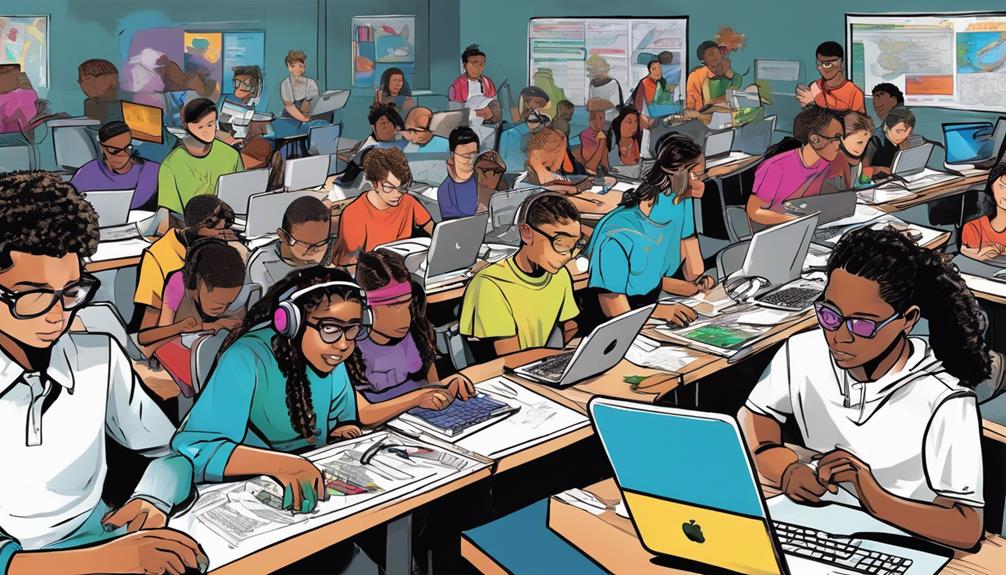Coding gives students **critical thinking**, creativity, and teamwork skills that are key in many industries. It helps tackle problems, sparks innovation, and leads to well-paying careers like software development and data analysis. Learning coding boosts logical thinking, problem-solving, and gets kids ready for future jobs. A coding curriculum preps students for a tech-filled world, opening doors to in-demand jobs. **Harness coding** to teach students the essential skills they need to succeed in today’s job market.
Key Takeaways
- Enhances critical thinking and problem-solving skills.
- Fosters creativity and innovation in program design.
- Cultivates patience through debugging and refining code.
- Opens up diverse career opportunities in tech-driven industries.
- Equips students with skills for the future job market.
Coding Benefits for Student Development
Coding benefits for student development are manifold, encompassing critical thinking, creativity, patience, teamwork, and career opportunities.
Through coding, students enhance their critical thinking skills by analyzing problems and developing logical solutions.
Creativity flourishes as they design unique programs and solutions.
Patience is cultivated through debugging errors and refining code.
Teamwork is fostered in collaborative coding projects, where students learn to communicate effectively and work together towards a common goal.
Additionally, coding opens up a plethora of career opportunities in various industries, emphasizing the importance of acquiring these skills early on.
Practical Applications of Coding Skills

The practical applications of coding skills extend far beyond the domain of software development, impacting various aspects of modern-day life. Through coding, individuals can automate repetitive tasks, analyze data to make informed decisions, and create interactive websites. Below is a table showcasing the diverse practical applications of coding skills:
| Practical Application | Description | Example |
|---|---|---|
| Automation | Writing scripts to simplify tasks | Creating a program to organize files automatically |
| Data Analysis | Using algorithms to extract insights | Developing a model to predict sales trends |
| Web Development | Designing and building websites | Creating an online portfolio to showcase work |
Coding as a Gateway to Careers

In today's technologically-driven world, proficiency in coding serves as a pivotal gateway to a myriad of lucrative career opportunities across diverse industries. With the increasing reliance on technology, coding skills have become invaluable.
Careers in software development, data analysis, cybersecurity, artificial intelligence, and web development are just a few examples of where coding expertise is highly sought after. The demand for skilled coders continues to rise, offering competitive salaries and job security.
Additionally, coding opens doors to freelancing and entrepreneurship, allowing individuals to work independently or start their tech businesses. Embracing coding not only leads to fulfilling career paths but also enables individuals to contribute to technological advancements shaping our future.
Coding Integration in Education Systems

Education systems globally are increasingly recognizing the necessity of integrating coding into their curricula to prepare students for the demands of the digital age.
The integration of coding in education systems offers several benefits:
- Enhanced Problem-Solving Skills: Coding teaches students how to break down complex problems into manageable parts.
- Improved Logical Thinking: Students develop logical thinking abilities by creating sequences of commands in coding.
- Fostering Creativity: Coding encourages students to think creatively to find innovative solutions.
- Career Readiness: Equipping students with coding skills prepares them for future job opportunities in various industries.
Future of Education: Coding Curriculum

Embracing coding as a fundamental component of academic instruction paves the way for a future-focused educational landscape.
The future of education increasingly involves integrating coding into the curriculum to equip students with essential skills for the digital age. By including coding as a core subject, schools can prepare students for a technology-driven world, providing them with the tools to thrive in various industries.
A coding curriculum not only enhances critical thinking, creativity, and problem-solving skills but also opens up a myriad of career opportunities in high-demand fields such as technology, finance, and healthcare.
As the importance of coding continues to grow, educational institutions are adapting to make sure students are well-prepared for the evolving job market and advancements in technology.
Frequently Asked Questions
How Can Parents Support Their Children in Learning to Code?
Parents can support their children in learning to code by fostering a positive learning environment, encouraging perseverance, providing access to coding resources, and showcasing real-world applications of coding. Involvement and enthusiasm can cultivate a child's interest and success in coding.
What Are the Best Coding Languages for Beginners to Start With?
The best coding languages for beginners to start with are Python, JavaScript, and Scratch. Python offers readability and versatility, JavaScript is essential for web development, and Scratch is ideal for introducing coding concepts to young learners through visual programming.
Are There Any Scholarships Available for Coding Education?
Scholarships for coding education are available through various organizations and institutions. Securing a scholarship for coding is like discovering a key to a treasure chest, revealing opportunities to learn valuable skills and pursue a rewarding career in technology.
How Can Coding Skills Be Used for Social Impact and Community Development?
Coding skills can empower individuals to create tech solutions for social issues, like developing apps for healthcare access or building platforms for community engagement. By leveraging technology, coding can drive positive change and foster community development.
What Are the Key Differences Between Coding and Programming?
Coding is the process of writing instructions for a computer to follow, focusing on creating algorithms and implementing them in a specific programming language. Programming involves broader tasks, including designing software, testing, debugging, and maintaining code.
Conclusion
To sum up, the significance of coding for students cannot be overstated. With its ability to enhance critical thinking, creativity, and problem-solving skills, coding is a valuable asset in preparing the next generation for success in a technology-driven world.
By integrating coding into education systems and emphasizing its practical applications and career opportunities, students are equipped with essential skills that will set them apart in a competitive landscape.
Embrace the coding revolution and discover a world of endless possibilities!










